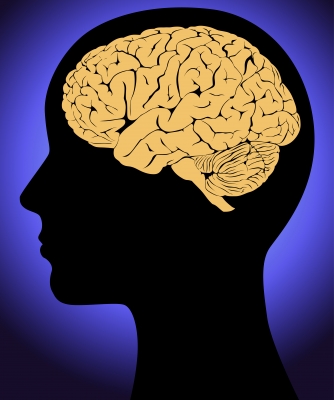Why do they say it’s in your head?
You may wonder why some doctors think IBS is a psychological condition? What exactly does the hated phrase “It’s in Your Head” mean and where does it come from?

Anyone with digestive issues knows it’s not in their head. So why do doctors use the term so often?
It’s based on the gut and brain connection. The gut and brain/head are connected through the nervous system. What happens in the brain can ripple to effect gut function and vice versa. Here’s a simplified synopsis of the science.
Our body’s communication system passes information from nerve to nerve. There are two nervous systems:
The central nervous system (CNS) –- the brain and the spinal cord
and..
The peripheral nervous system (PNS) – nerve pathways that extend beyond the brain and spinal cord.
The peripheral nervous system is further divided into two parts:
Somatic nervous system –- responsible for voluntary control of muscles and reaction to external sensations.
and the…
Autonomic nervous system – responsible for the motor and sensation responses of our internal organs (viscera).
Within the autonomic nervous system there’s the Enteric Nervous System (ENS) that regulates digestion, motility (involuntary muscle contractions) and the secretion of fluid and blood.
ENS is often referred to as “the little brain” because it is responsible for so much vital involuntary body function. When normal function of the ENS is disrupted it can cause gut and elimination issues. (Is the ENS also called the rest and digest system?
WHAT CAUSES ENS DISRUPTION?
Communication issue can occur between the central nervous system (the brain) and the enteric nervous system (the digestive organs) can be symbiotic. This means that gut sensitivity (experienced by nerves in the gut) can effect brain function and cause particular emotions, thoughts and reactions.
Likewise, when the brain is experiencing anxiety or stress, it can travel through nerves to the ENS/gut and disrupt normal function. That’s why some doctors think stress is responsible for IBS symptoms.
Digestion is optimal when the central nervous system (the brain) is calm.
According to Dr. Bolen, the About.com guide for IBS, “abnormal functioning along two separate pathways in the autonomic nervous system is associated with the symptom of diarrhea. In general, it seems that dysfunction in the brain-gut communication system is interfering with the body’s ability to maintain homeostasis, a state in which all systems are working smoothly.”
Serotonin plays an important role in the communication system between the brain and the gut and is the hot subject of current IBS research. Serotonin regulates motility, sensitivity, and secretion of fluids and 95% of the serotonin in your body is produced in the gut.
Research has shown a difference is serotonin levels in patients who have diarrhea vs. those who have constipation. Those with diarrhea had higher levels of serotonin in their blood following a meal, while patients with constipation had lower levels of serotonin. One school of thought is that the excess of serotonin interferes with the process of homeostasis, thus preventing the digestive system from functioning in a normal way.
That’s why some doctors prescribe serotonin boosting or blocking medications like Lotronex for diarrhea and Zelnorm for constipation. Medications can also have negative side effects or stop working.
Medication may manage symptoms but don’t solve the underlying problem of faulty nervous system communication.
The best treatment for this communication problem is simply calming the disturbance in the nervous system. Non medical solutions like qi gong, ta chi, biofeedback, EFT, restorative yoga or yoga nidra is a much better way to calm the nervous system than medication.
The next time you think stressful thoughts, notice if you feel reactive sensation in your gut? It may take a bit of practice before you can actually feel the sensation. That’s why, ironically, the stress brought on by IBS symptoms can make symptoms worse.
So if the problem is the head/gut connection, why don’t doctors suggestion relaxation techniques to calm the enteric nervous system?
According to this theory, stress is one IBS, but what about food?
Usually foods are not the cause of IBS, just a further irritant. Your body overreacts to certain foods because it is already unbalanced. If your body is overreacting to stress, its probably going to overreact to “stressing” foods also.
WHAT YOU CAN DO:
The parasympathetic nervous system is also called the “rest and digest” response. We want to turn off the down the sympathetic nervous system that is responsible for fight or flight (which shuts down digestion to mobilize the body for escaping or defending) and turn on the parasympathetic system so the body can repair itself (go into superhealing mode!).
There are many ways to calm your nervous system and create smoother communication between the brain and the gut. The first action step is to take no action at all. Simply lying on the couch on staring out the window, at the sky or at wind blowing in a tree, will help your nervous system recalibrate. It sounds easy but it can be difficult to do, especially if you mind is racing and your body is buzzing. You might have to resist the urge to sit up and start doing stuff.
If you want to do something more structured, there are many choices. Restorative yoga or yoga nidre are options. (insert link to blog post). You can also try knitting, meditation, tai chi or laying in the grass in the park. If you need structure, pick and schedule this “non activity” but if you can’t handle structure I suggest laying on the floor and visualizing your body melting into the ground like an ice cream cone. This will ground you and get you back into your body. Take a 5 minute “ice cream break” or two each day will make a difference in the function of your nervous system. Try it and see.
 Angela Privin is proof that IBS is NOT an incurable disease or a disease at all. IBS is a body out of balance. It’s an invitation for change. After solving her own IBS mystery more than a decade ago Angela trained as a health coach to help others.
Angela Privin is proof that IBS is NOT an incurable disease or a disease at all. IBS is a body out of balance. It’s an invitation for change. After solving her own IBS mystery more than a decade ago Angela trained as a health coach to help others.
Angela uses both science and intuition to help people figure out what’s out of balance in their body. She works with lab tests, dietary changes, supplementation and nervous system rebalancing. Get help rebalancing your digestive system and solving your IBS mystery here.






Recent Comments